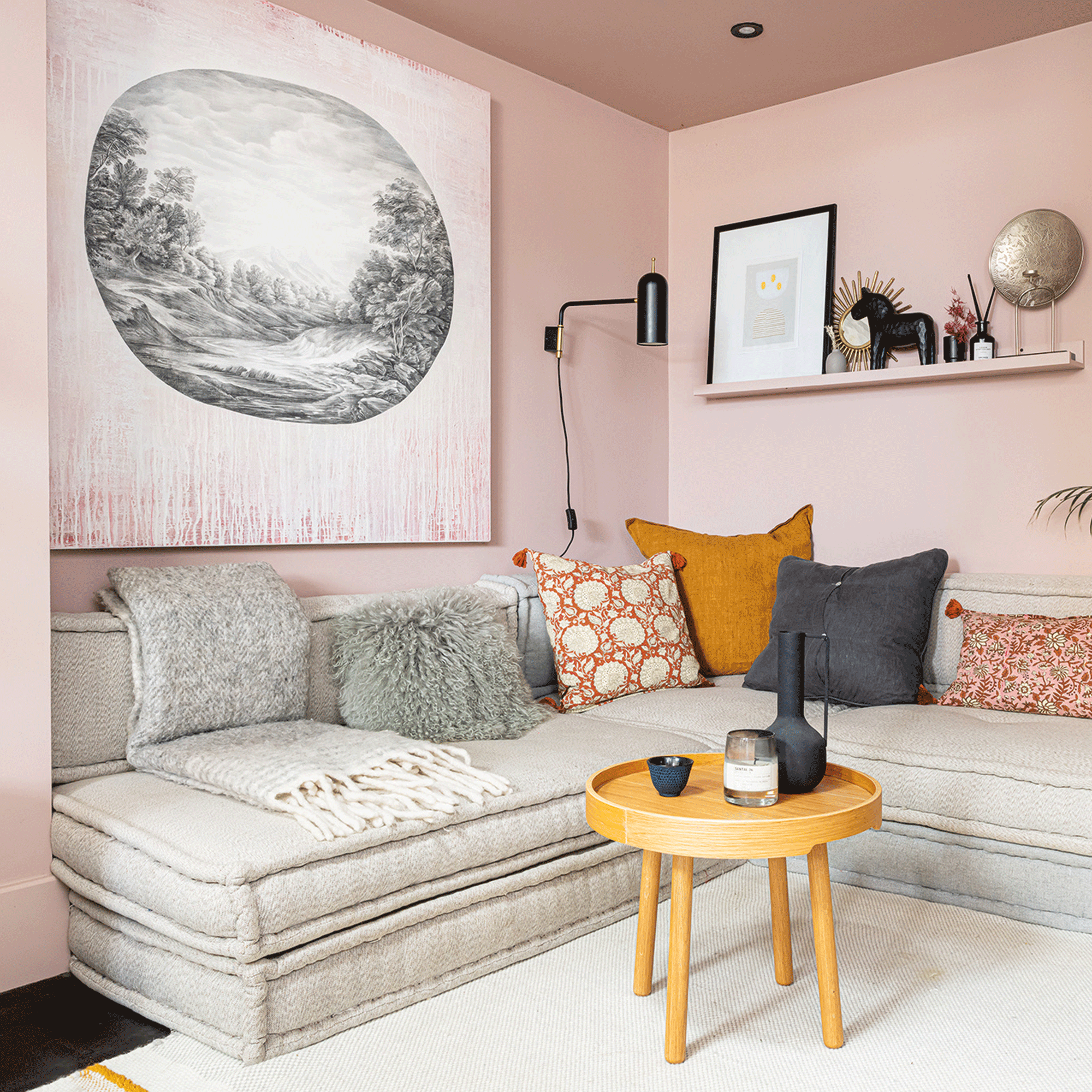
There’s no doubt about it, pink is having a definite moment right now. But the best pink paint has always been popular, from pink living room ideas to pink bedroom ideas, it's rarely fallen out of fashion.
According to Wickes, they alone sell 30,000 litres of pink paint every year. However, it can be difficult to know which shade of pink to use where. The vast array of pink paints to choose from can also make it overwhelming. There is everything for hot pink, through to pale pinks that are effectively neutrals.
So if you’re looking for the best pink paint for your home we’ve put together our definitive guide to choosing the right shade, along with plenty of great advice from a whole host of experts and industry leaders. Whether you’re looking to add a pop of pink with a feature wall or want to paint an entire room pink, we’ve got you covered.
‘The process of selecting the perfect pink, or any colour, starts with how you want the space to feel,’ reveals Flora Hogg, Interior Design Consultant and Colour Specialist at Craig & Rose Paints. ‘Pink paints have a tendency to come out as cotton candy or bubble gum. Therefore, it's crucial to sample and assess how the pink adapts to natural lighting during the day and artificial lighting at night.’
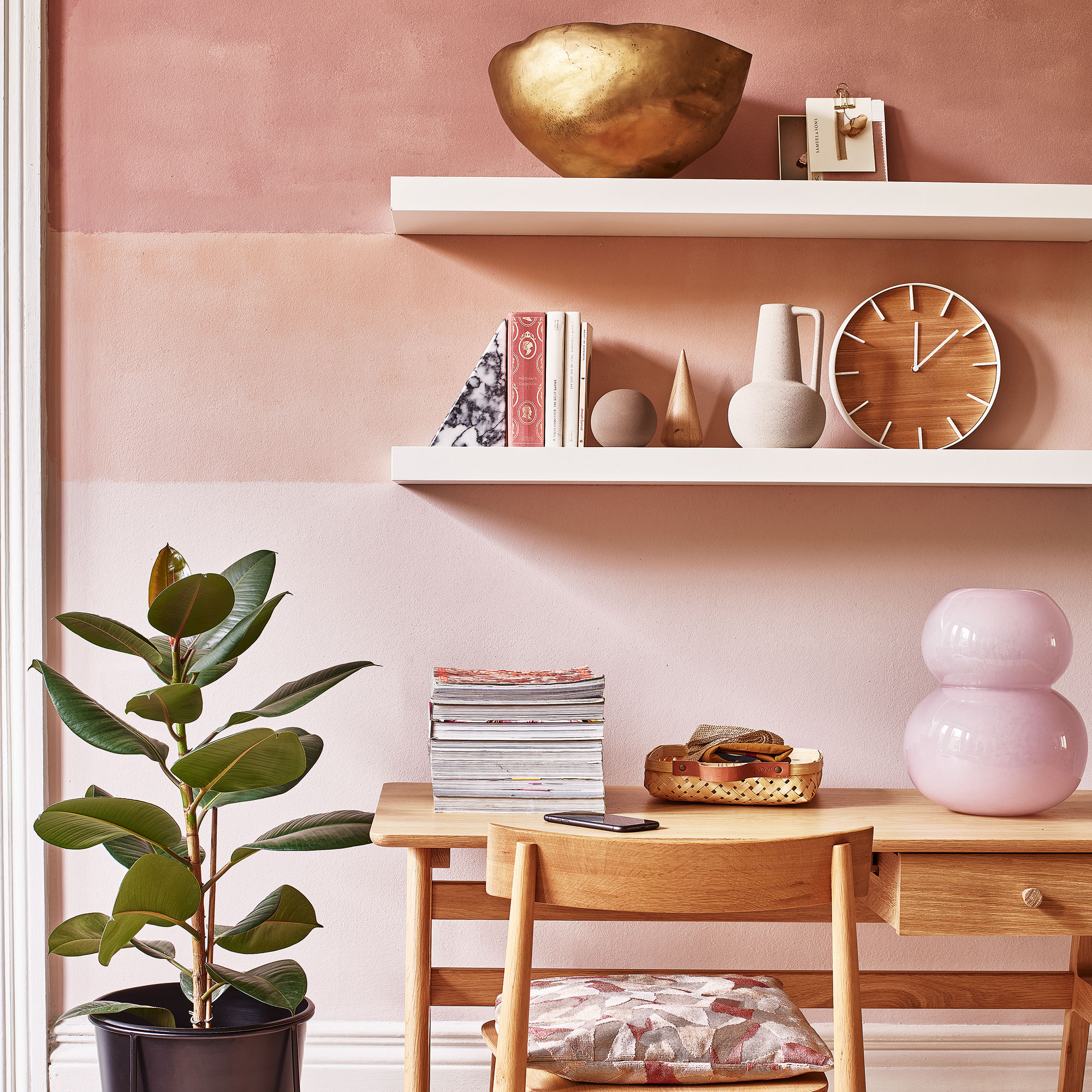
‘Be sensitive to the pinks you gravitate towards, taking note not only by hue but luminosity and saturation.’
Another ‘one of the most important factors to consider when choosing any paint shade is the orientation of the room – north facing rooms will be darker and south facing rooms brighter receiving light throughout the day,’ advises James Greenwood, Paint Expert at Graham & Brown.
‘You will also need to consider what the function of the room is; relaxing areas like bedrooms or bathrooms should be complemented with earthy soothing pinks whereas more lively areas such as kitchens can be painted in more vibrant shades.’
The best pink paint
‘Pink is a colour of opposites, and creates a physical reaction,' says Tash Bradley, Lick's Head of Interior Design and Colour Psychologist. 'Paler pinks, such as Lick’s Pink 03, create soothing and nurturing physical reactions, whilst hot pinks, such as Lick’s Pink 12, do the polar opposite. Hot pink creates a sense of urgency and passion, and can make you feel lustful and romantic.'
‘In recent years pink has really found its way into every corner of the home, with customers incorporating its vast range, from gentle plaster and powder-like hues, to warm peachy tones and bright statement pinks within their design schemes,’ according to Ruth Mottershead, Creative Director at Little Greene.
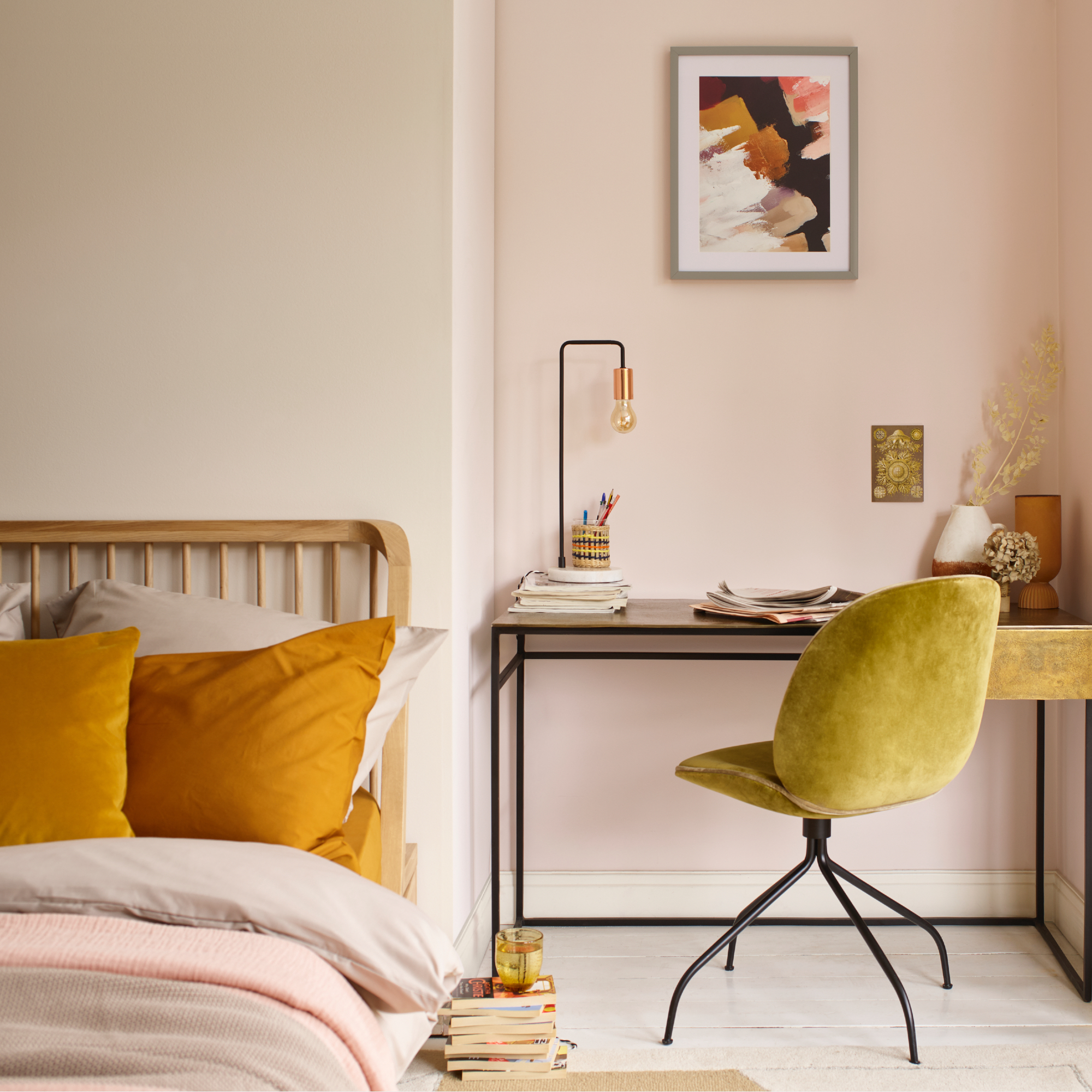
‘There are many trends in the world of interiors and further that are influencing the use of pink in our homes,’ James explains. ‘Barbiecore is an inescapable trend right now and is a huge contributor to the love of all things pink.’
But that isn’t the only reason that pink is currently trending. An increasing number of homeowners are embracing their own design choices and styles, instead of worrying about what will appeal to future buyers.
How to choose the best pink paint
But which shade is right for you? 'There’s nothing quite like an injection of vivid pink to brighten a room. If you are an extroverted individual, and you love being the boldest in the room, hot pink is your ‘it’ colour for 2023 - sure to make a stylish statement,' Sam Greig, Senior Designer at Swoon states.
‘Hot pink exudes playful and fun vibes, but can also ooze a cheeky romantic side - depending on the way you choose to style it.'
‘If you prefer a more neutral tone, blush pink, also coined as millennial pink, is a soft, beige-rose that has been continuously popular since its first big break in the 1990’s,’ Sam continues.
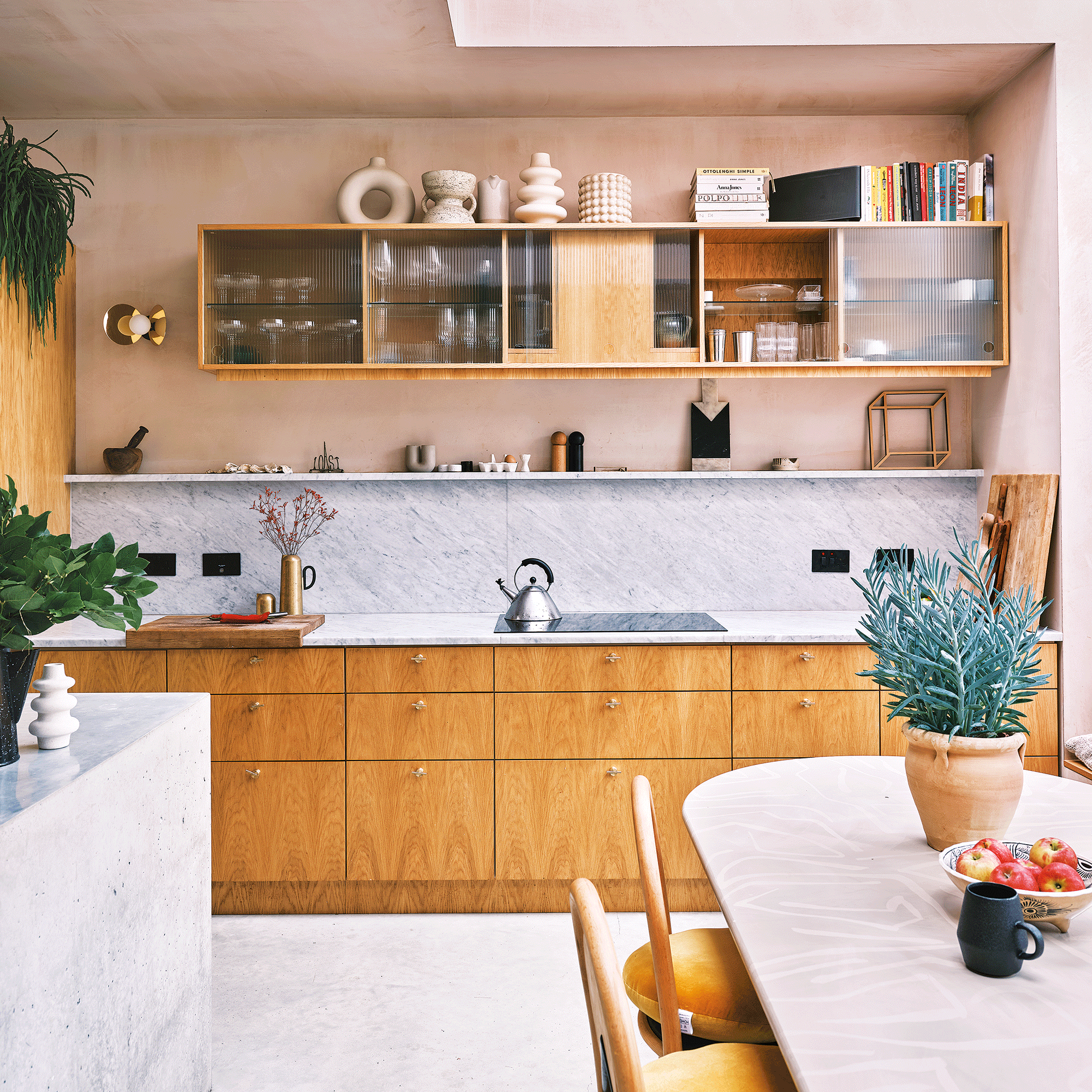
‘Blush pink is so popular due to its versatility. Whether you choose to pair it with jewel-toned blues and greens, pastel yellows or neutral nudes – the shade will adapt to the space it is placed in, and complement its surroundings with sophistication.’
‘For those wary of using pink, try out samples before taking the plunge,’ suggests Cathryn Saunders, Creative Director at Earthborn. ‘It’s understandable that you might be hesitant to go straight into painting your walls pink, which is why purchasing sample pots of different shades is a good way to test the waters.’ This will also allow you to see how the different hues will look alongside your existing decor and furnishings, as well as how it appears in various lighting throughout the day.
But let's break it down further.
1. Best pink paint for small rooms
White based pinks and pastel shades (or go bold)
‘The best shade of pink paint for small rooms are lighter shades as they reflect more light and help create a sense of brightness and airiness. Lighter pinks can make walls appear to recede which gives the illusion of a more open space,’ Cathryn states.
‘Similarly, opting for soft, muted tones can visually expand a room and make it feel larger than it actually is whilst creating a sense of calmness. I would recommend our shade 'Piglet', a soft white with a slight pink touch to help really open up the room.’

Choosing pink paint with a white base and just a hint of pink will make the room look lighter and brighter. This kind of shade can also be a great way to dip your toe into the pink paint trend. ‘If the very nature of pink makes you nervous, start small and look to pink-tinged off-whites such as ‘Dimity’ or ‘Tailor Tack’,’ suggests Patrick O’Donnell, International Brand Ambassador for Farrow & Ball.
Flora also recommends ‘painting the ceiling the same colour as the walls to expand the perception of openness and radiance,’ in a smaller room.
'Opting for a softer pastel shade is also a good solution, perfect in smaller rooms, where the more delicate beauty of a subtle pink will bring a sense of freshness due to their light base,’ according to Ruth.
Emma Bestley, Co-Founder and Creative Director of YesColours echoes this by agreeing that you can ‘create the illusion of an airier and larger space with the softness of a carefully chosen pastel.’
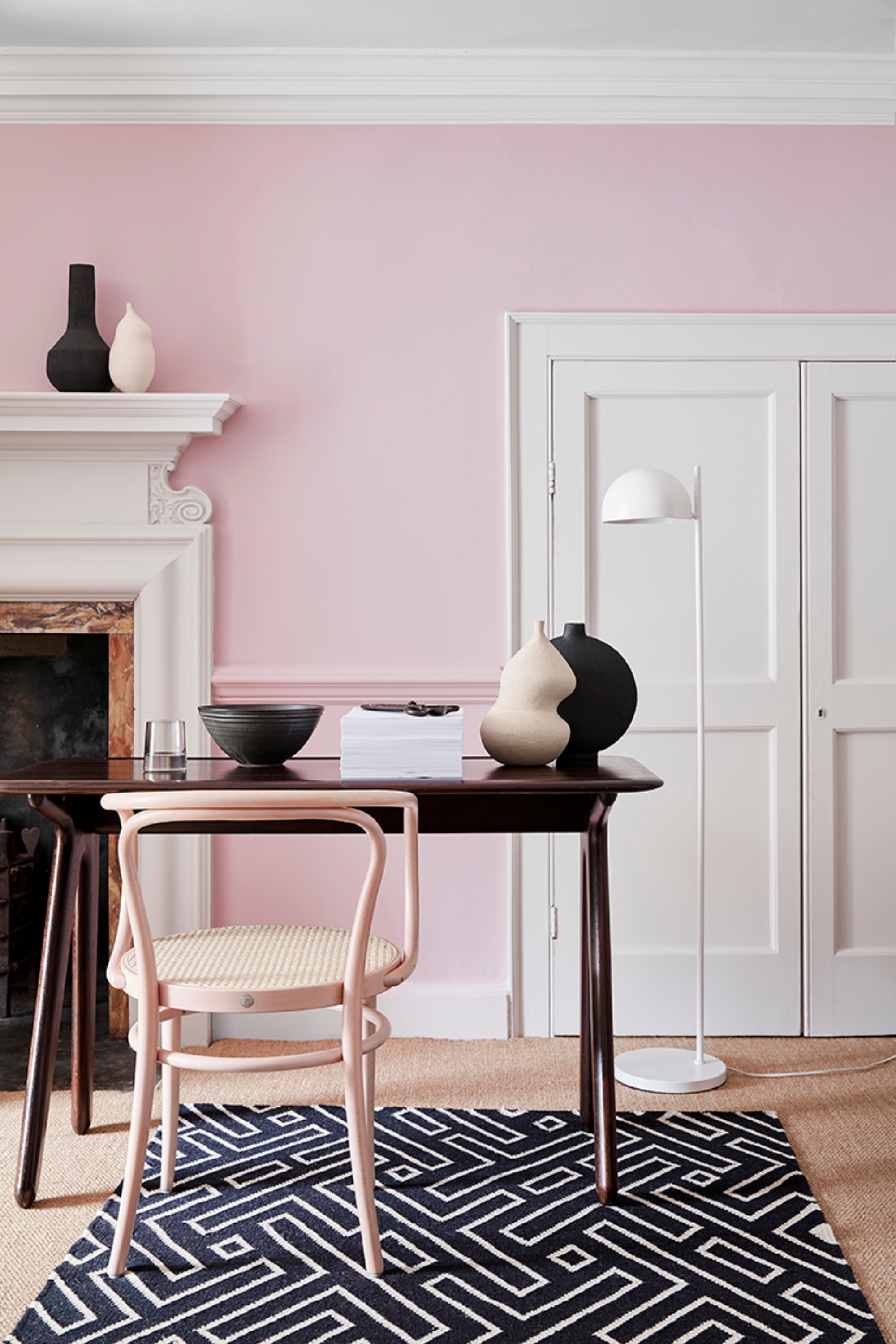
However, ‘if you are looking to incorporate pastel shades, but don’t want a scheme that feels too sweet, ground a pastel shade with a bolder hue,’ to create more atmosphere, says Ruth. A bold pink used all over can also be a great option for those with more of a maximalist design style.
Emma from YesColours continues, ‘adorn the space with a daring pink palette, taking the focus away from the size of the room. Our 'Passionate Pink' paint is the one to go for if you want that real hit of confidence when designing a small space; the boldness of the colour can transform the room into a visually enticing and exciting space.’
2. Best pink paint for north-facing rooms
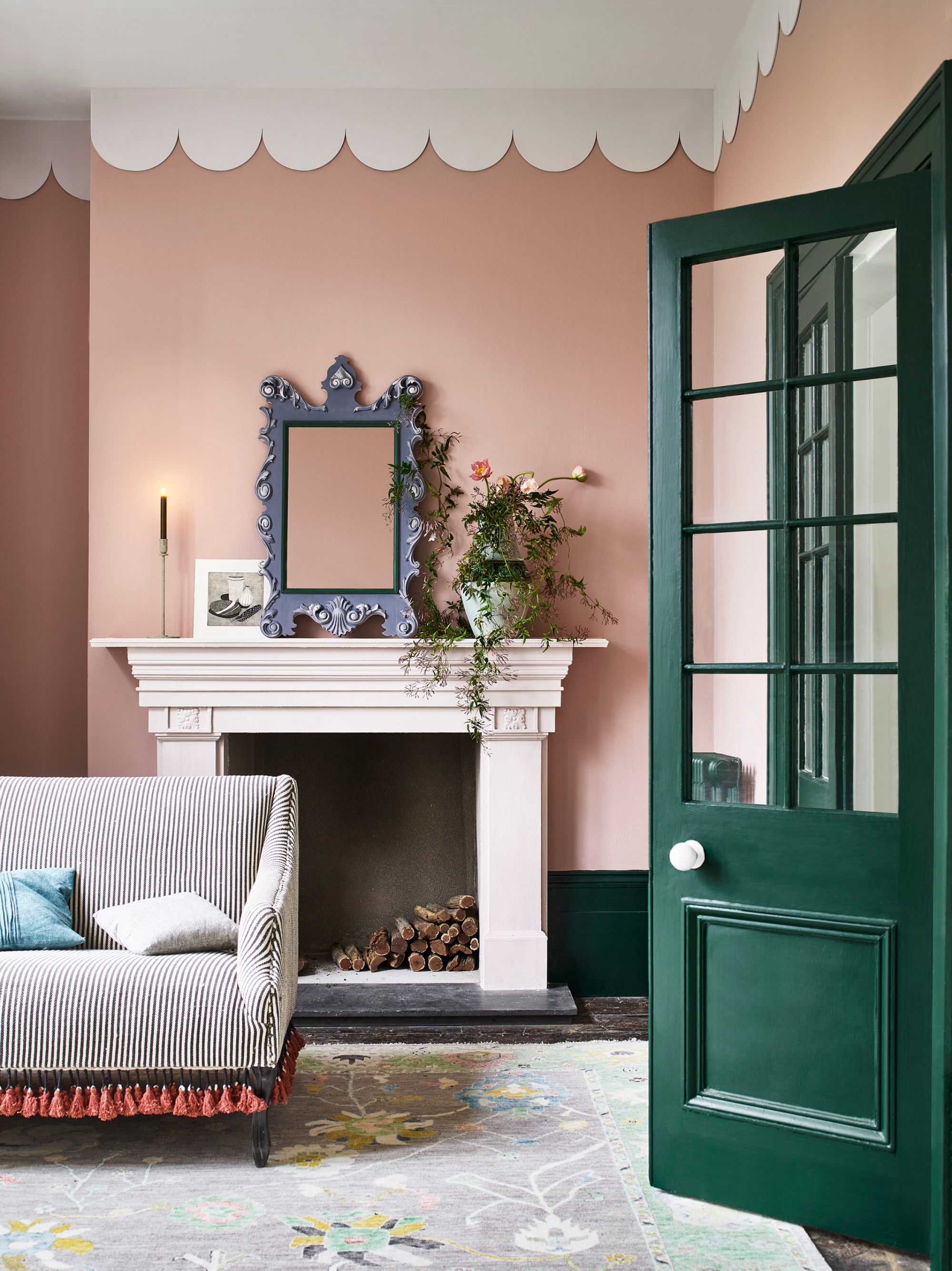
Warm pinks
‘Pink is a perfect colour for north-facing rooms,’ asserts Emily Simmons, Creative Director at innovative interiors brand, Ruggable. ‘Generally known to be cooler rooms, due to the lack of natural light they receive, north-facing rooms can be easily warmed up, as long as you pick the right shade.’
‘Blush pink is one of my go-to colours to use in north-facing rooms. It’s a softer hue, which helps to keep the room looking lighter, whilst bringing a touch of warmth to the walls. If you opt for a hot pink or darker shade, it can make the north-facing room appear even darker, so I advise opting for a lighter shade of pink,’ Emily continues.
Since ‘natural light tends to be cooler and softer in north-facing rooms, it's important to choose a pink paint that can counterbalance the dimness of the light,’ says Emma from YesColours. ‘We’d recommend a pink that offers a subtle and calming effect. Our ‘Mellow Pink’ is one of our duskiest shades, speaking of vintage roses and antique fabrics. Its relaxed and dreamy tone can work nicely in this environment, contrasting the light and creating a cheerful and positive ambiance.’
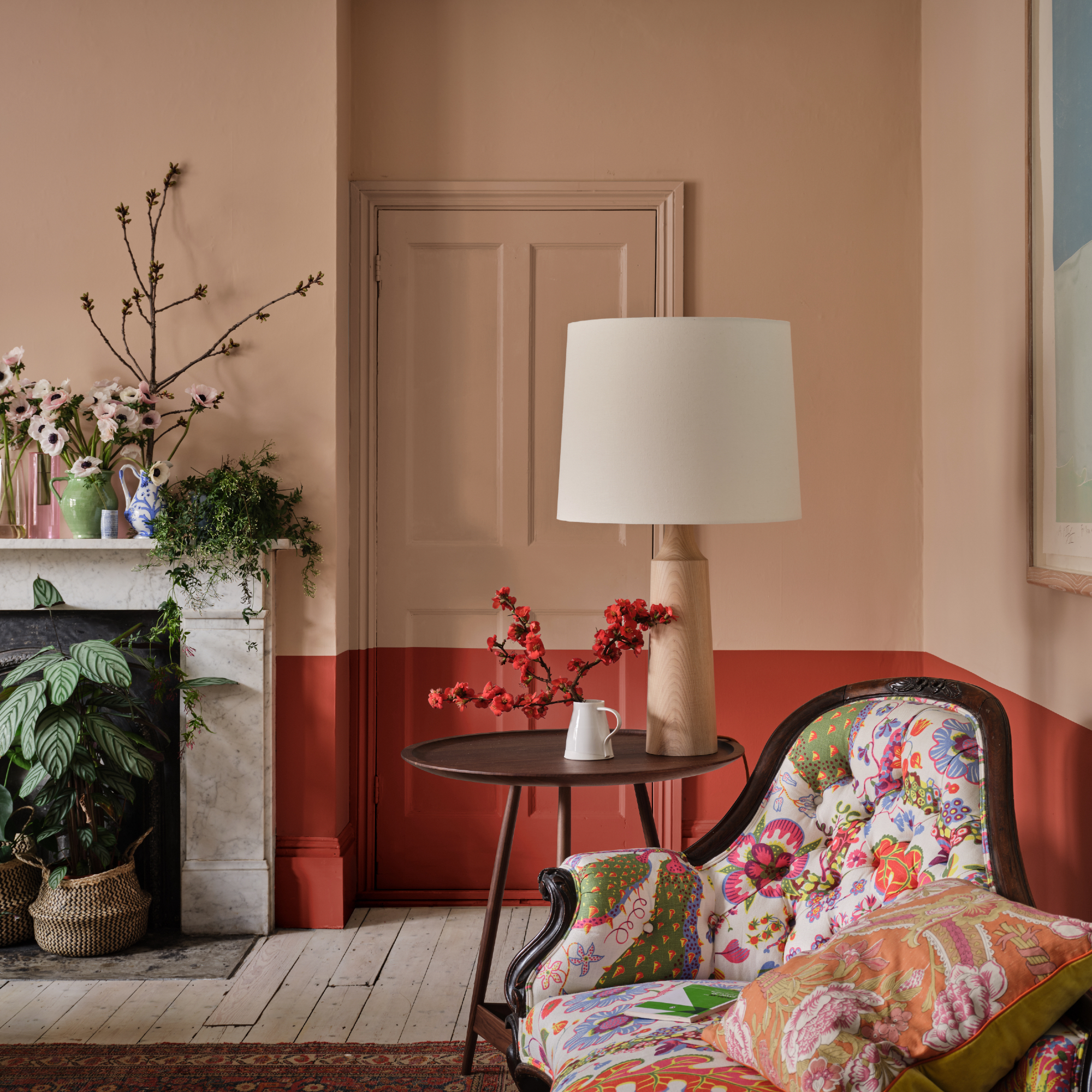
Cathryn announces ‘ideally, it is best to use pink shades with a warm undertone. As such, you are creating a counterbalance with the lack of natural sunlight and creating a more cosy atmosphere. A soft pink, such as Earthborn's ‘Rosie Posie’, is ideal for north-facing rooms, as it has dusky rose undertones.’
While Patrick from Farrow & Ball agrees, '‘Setting Plaster’, or the slightly deeper ‘Templeton Pink’, will bring warmth to a north-facing space.'
3. Best pink paint for south-facing rooms
A range of different pinks
Since south-facing rooms get a lot more natural light with some being bathed in golden sunlight throughout the day, this opens up a lot more options, as long as you take into consideration the sometimes yellowish light that south-facing rooms can experience.
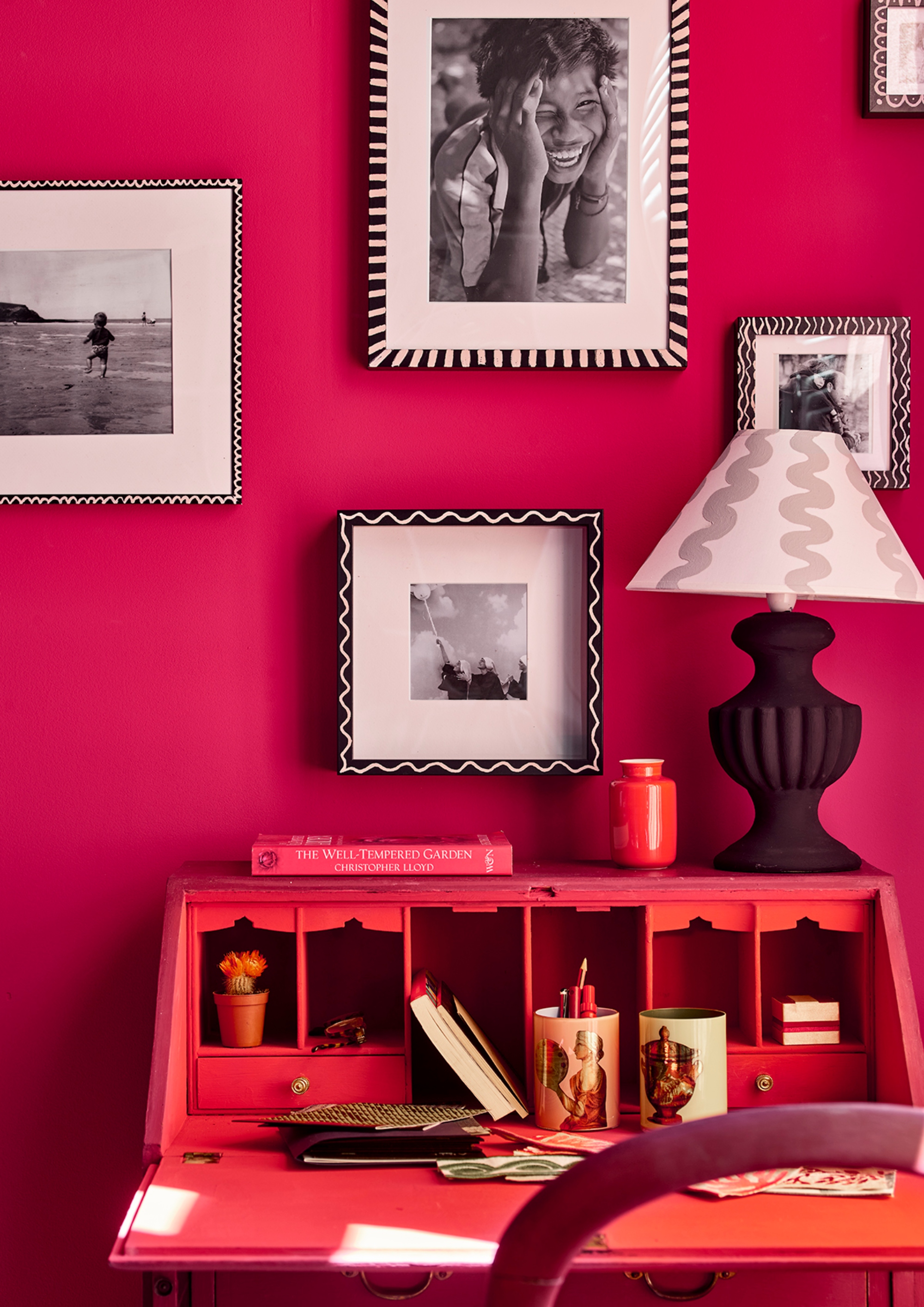
‘Homeowners can choose from a wide range of pink paint colours in south-facing rooms to enhance the natural bright and sunny atmosphere present,’ Emma from YesColours remarks. ‘A gentle pink like our ‘Calming Pink’ paint is a pale and understated pink shade that can complement the warm natural light, while adding a touch of elegance and sophistication. A light pink hue works best in south-facing bedrooms, living rooms, or any areas where you want to create a serene and inviting atmosphere.’
Cathryn agrees with this. ‘If you’re wanting a splash of pink in a south-facing room, you have a lot more flexibility. South-facing rooms receive ample natural light throughout the day, and the natural warmth of pink shades will appear stronger. Bold pinks will appear more vibrant, so if you have a room with intense warm light it might be better opting for a cooler pink shade, unless a bold, vibrant look is what you’re going for.’
The iconic ‘’Sulking Room Pink’ will deliver a bygone elegance to a south-facing sitting room or bedroom, and is also a brilliant choice for kitchen cabinetry,’ according to Patrick from Farrow & Ball.
While Flora also acknowledges that ‘south-facing rooms can embrace earthier tones of pink, such as Craig & Rose's ‘Pink Beige’ – an earthy clay rose, or ‘Fresh Plaster’ - a gentle pink neutral.’
‘These delightful hues exhibit their true beauty in spaces blessed with an abundance of natural light, where you can fully appreciate the delicate undertones and nuances that unfold throughout the day.’
4. Best pink paint for ceilings
Bright and bold pinks
‘Ceilings are often painted white, out of habit. Simply changing your ceiling colour and integrating it into your design scheme, will have a profound effect on the atmosphere within the space, as well as being the perfect opportunity to make a design statement,’ says Ruth.
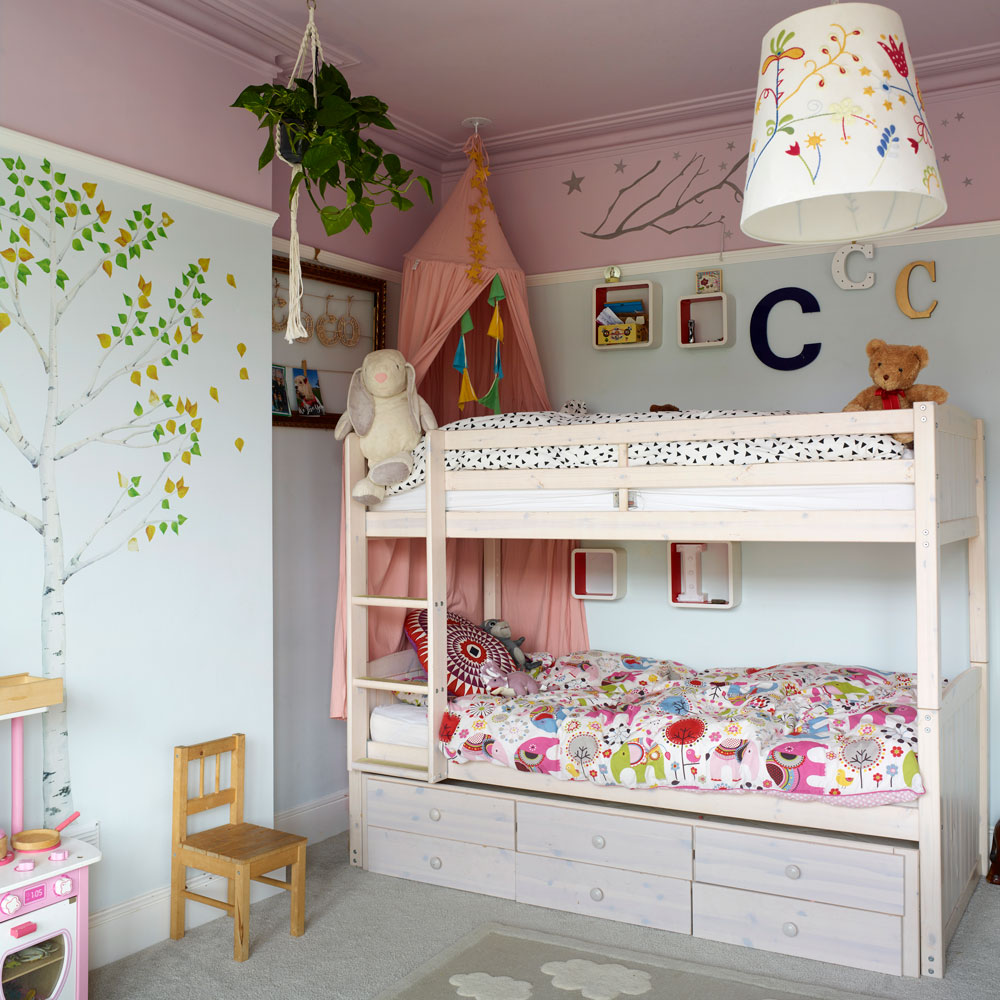
‘Painting the ceiling, also known as the ‘fifth wall’, truly is a hidden gem when wanting to transform your space,’ says Cathryn. ‘If you’re blessed with high ceilings, opt for statement bold colours such as hot pinks or fuchsia to create a striking, luxurious feel to the space. If you don’t have high ceilings but still want to embrace a statement shade, bold colours painted on lower ceilings can create a cocooning effect, perfect for rooms like the snug, hideaway or a cinema-style room.’
James from Graham & Brown echoes this sentiment, ‘for a statement, use a pop of bright pink shade 'August' on the ceiling and compliment with a more pared back pink shade such as 'Pink Sands' on the walls.’
Which colours complement pink?
‘The colours you choose to use alongside a pink, will in part determine the effect of the colour within your space. For a soothing interior scheme, green is a great choice, as the true colour of nature, it makes us feel comfortable within the home. It is a shade that we associate with the tranquillity of the outdoors,’ suggests Ruth.
Paint and colour expert Annie Sloan also has a few recommendations for other colours that work particularly well with pink.
‘Soft, naturalistic greys look beautiful with a neutral pink. I often use 'French Linen' with 'Antoinette' (my earthy-neutral pink) because 'French Linen' is a complex grey that allows the pink to grow and breathe and warm up. It’ll bring out the earthiness and the warmth of 'Antoinette'.’
While ‘deep burnt reds with soft neutral pinks will create a sophisticated tonal palette with a lot of warmth. Burgundies and neutral pinks invoke thoughts of opulent Renaissance paintings; think swags of burgundy fabric pulled back to reveal reclining nudes.'
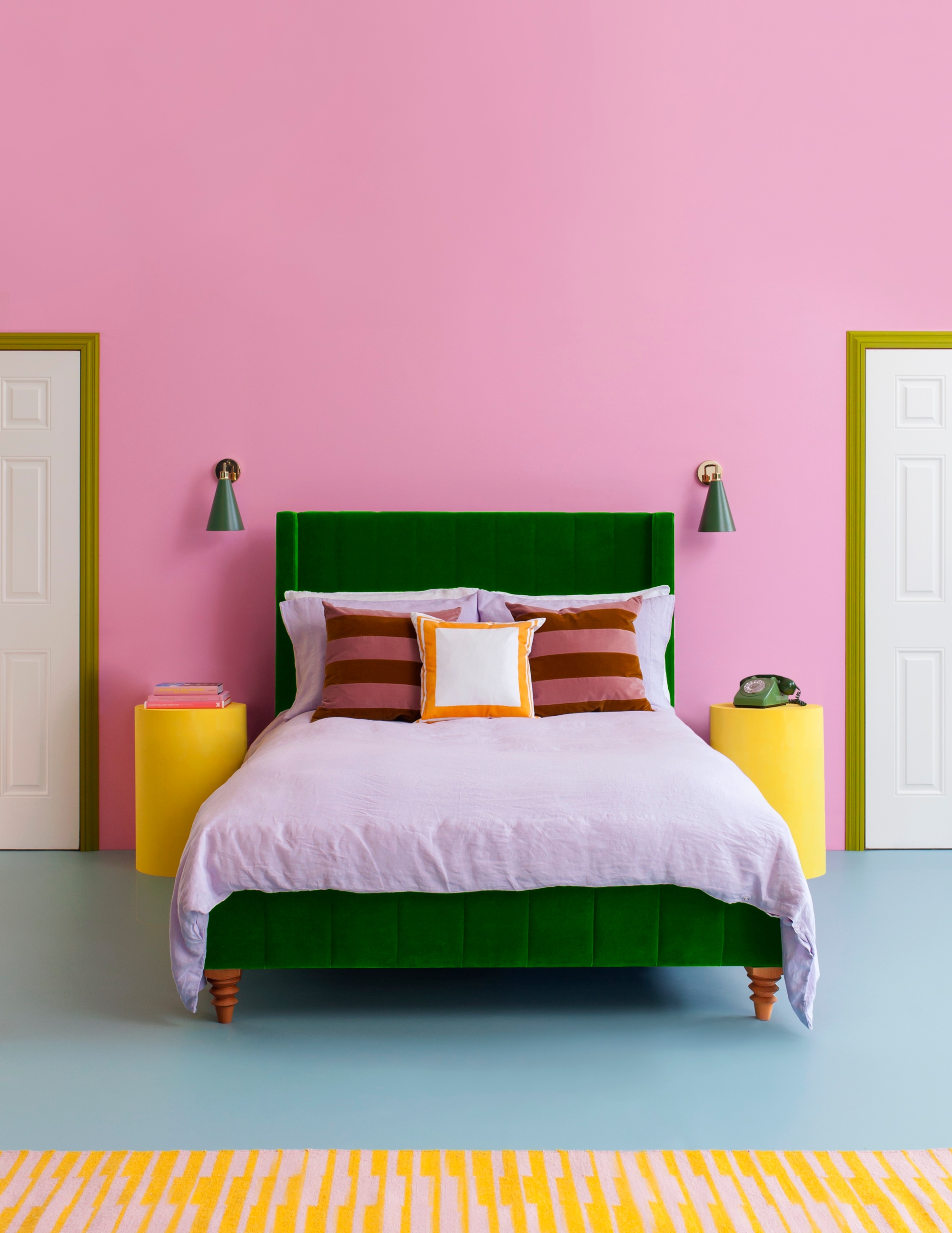
'Using colours from the same spectrum in any hue in different intensities gives texture, depth, and a sense of lavishness to a space, but it’s especially easy to do with pinks. Alternatively, bright oranges and turquoises with neutral pinks give that tropical, jungle intensity. There’s a reason we see this colour combination all over our Instagram feeds! It’s very effective, it shows confidence in colour and a certain joie de vivre.’
If you go for a pastel shade of pink, other pastel hues will work harmoniously in your space. ‘Consider pretty pastel pinks, mint greens, sky blues and delicate lilacs which all work together to create a charming and playful atmosphere,’ says Ruth from Little Greene.
‘If you are looking to incorporate pastel shades, but don’t want a scheme that feels too sweet, ground a pastel shade with a bolder hue. A soft pastel shade such as ‘Hortense’ works beautifully with clean mid tone greys such as ‘Mid Lead Colour’ for an elegant scheme or a or deep plum aubergine such as ‘Adventurer' for an impactful yet intimate atmosphere,’ Ruth adds.
How do I choose the right pink paint?
While we’ve outlined some of the experts' top picks and recommendations, it’s important to evaluate the specific room that you’re looking to paint pink and how you will use that particular space in your home.
Start by identifying which room you want to paint pink, ‘whether this be the bedroom, office, kitchen or living space. Different shades of pink can create different atmospheres, so it is important to be mindful in deciding what mood you want to evoke in the room and ultimately the room’s purpose,’ Cathryn adds.
‘Soft pinks work well in bedrooms as they foster relaxation in a soothing environment, whereas bold pinks can boost energy and alertness so are best for offices or other creative spaces.’
‘The size of your room can influence your paint colour choice. Lighter pink shades can make a space feel wider and spacious whereas darker, bolder pinks can be used in a larger room without feeling overwhelming. Alternatively, darker pink shades are great to use in a snug or hideaway room to make it feel more cosy and intimate,’ Cathryn concludes.







